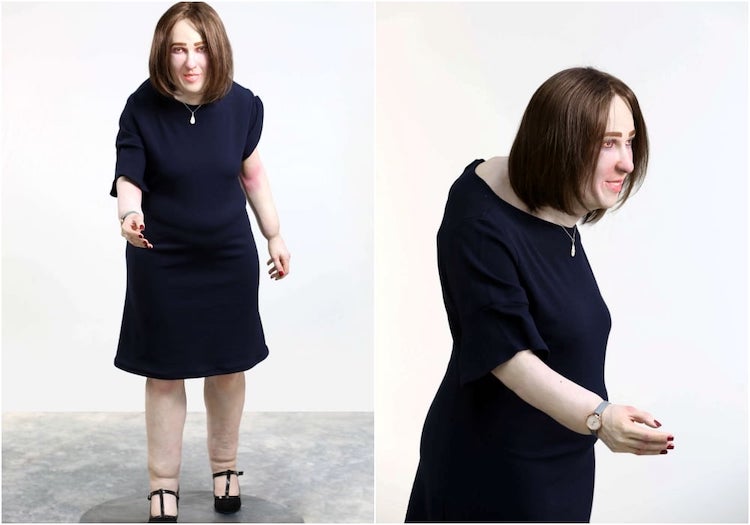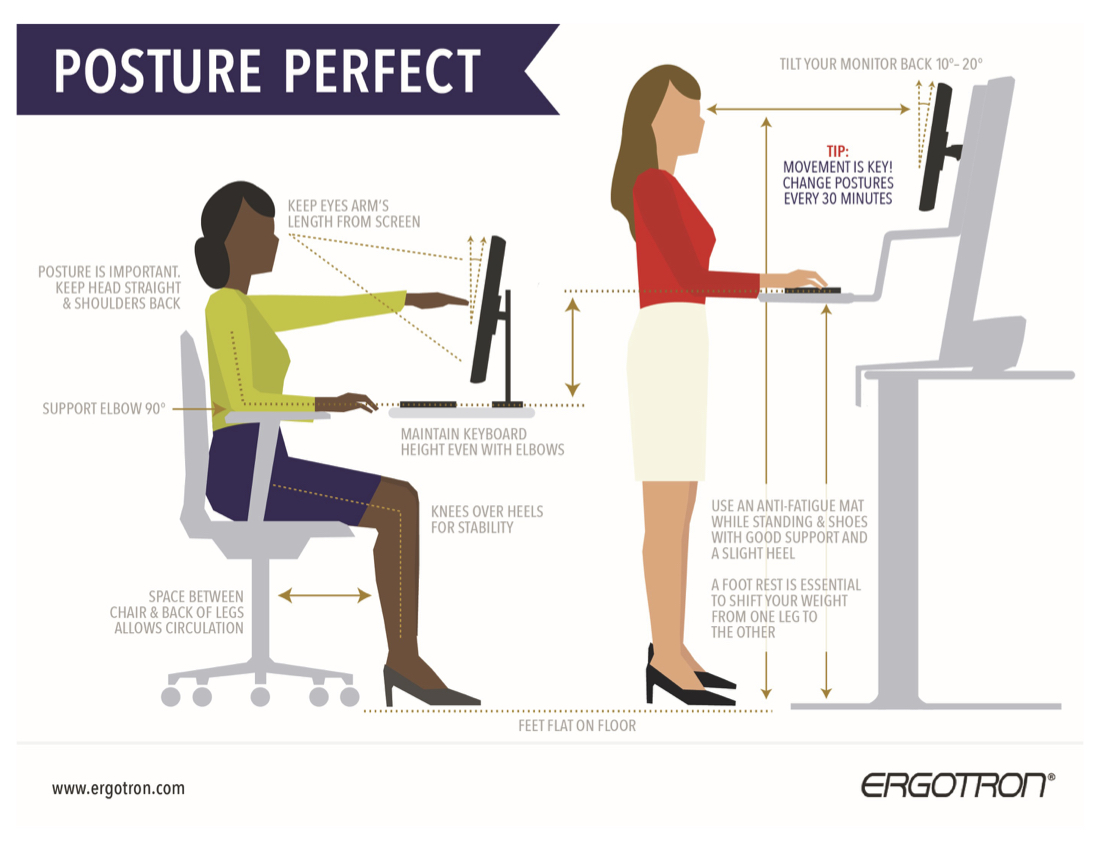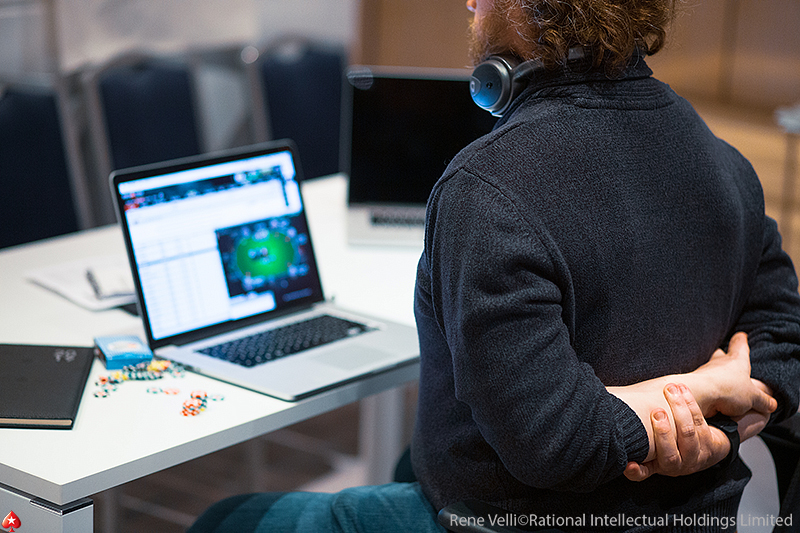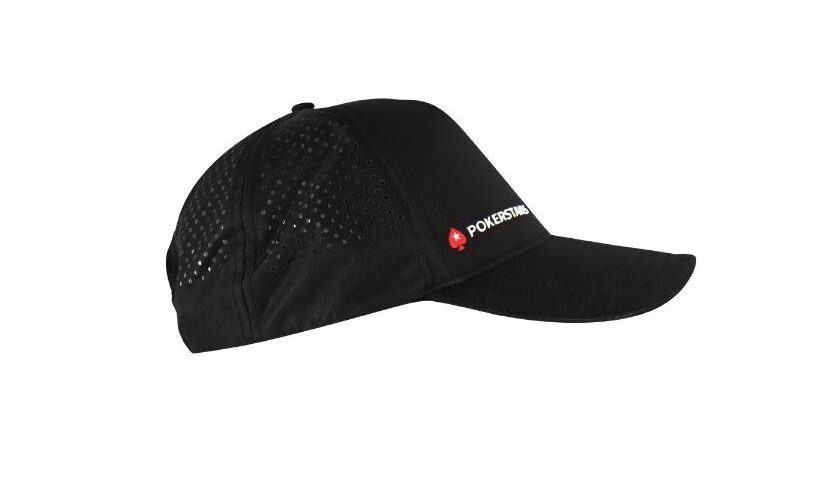This article was originally published in January 2020.
Last summer, office workers in the UK found themselves staring at a chilling vision: a model named “Emma”, who was introduced as their “Work Colleague of the Future“.
From a distance Emma appeared to be not too dissimilar from the kind of person most people see several times per day, shuffling around their office. But when viewed up close, or particularly from the side, it looked as though Emma had stepped out of a horror movie.
“Emma has a permanently bent back now because of the way she’s been sitting at her workstation,” said a behavioural futurist name William Higham, who played Dr Frankenstein to this particular monster. “The muscles in her legs are much weaker. She has varicose veins because of blood-flow, which is not as good as it was. Her eyes are redder, again because of the quality of the air. She has more nose hair, more ear hair, she has a swollen nose. She’s much more stressed, so therefore we see stress-related eczema on her arms. And also Emma has kind of a sallow skin because she’s been in artificial light for so many years.”
Yikes.
Higham had been commissioned by a workplace solutions firm, Fellowes, to produce Emma, based on global research as to the damaging impact of working in an office for many years — something that many millions of people worldwide have done for the much of the past century. The idea, of course, was to use Emma as an object lesson in the dangers of this lifestyle and to encourage companies to introduce preventative measures to alleviate the risks to their employees.
Although professional online poker players are not beholden to a boss, and relish the fact that their job allows them the freedom of choosing their own working hours, there’s no getting away from the truth that this lifestyle too involves a lot of sitting down and looking at screens. To make a career of poker requires putting the hours in, and the more you play, the more you’ll come to realise that there are many similarities to an office-based job.
“Emma” could be more than just your work colleague of the future. She could be the online poker player of the future too, unless players learn the same lessons Higham and colleagues encourage in office workers. All offices in the European Union are required to carry out workstation risk assessments for every employee, determining specific requirements and aiming to reduce the risks of injuries or long-term health issues. Though a poker player will not have a multinational organisation peering over his or her shoulder, there’s no reason you can’t conduct a similar assessment yourself.

“Emma”, our work colleague of the future
Here we take a look at a few of the key findings of numerous studies into posture and office ergonomics, and offer a few pointers to keep you healthy while you play. Are you sitting comfortably? No? Well, that’s where we’ll begin.
WORKSTATION
“We’re regularly spending hours at our desks with little movement, and our bodies are starting to atrophy in response. It’s accelerating not just musculoskeletal disorders and weaker limbs, but blood clots, heart disease, diabetes and even cancer.” — William Higham, “The Work Colleague of the Future”
If you’re going to spend many hours a day in the same place then you need to do everything you can to make sure it’s comfortable. In the case of an office workstation, where movement tends to be limited to a few small tasks repeated frequently (clicking a mouse; typing a bet-size on the keyboard) you need to make sure the set-up is one that does not place any unnatural strain on your body.
Almost all workstation guides, including How to Sit Correctly, provided by the UK-based Posture People, stress the importance of adopting a natural, upright position and adjusting a chair to suit your particular height and stature. Posture People advise finding the right seat depth, adjusting the height of your chair so that your armrests are on the same level with the top of the desk, and then resting your arms at a natural angle. “Your elbows and knees should be positioned at a right angle, which can be achieved with the use of a footrest and height adjustable chair/desk,” state Fellowes in one of the company’s guides to correct posture. The top of your monitor or laptop should be in line with your eyebrows, while your keyboard and mouse should be close together to “prevent sore shoulders from over-reaching”.

Office posture overview
Cornell University also published an extensive check-list to ensure correct office posture, and the university’s researchers suggest that sitting with poor posture can create up to 90 percent more pressure on our backs than standing. It means that you should seek out a chair with decent lumbar support, or even consider a standing desk, which helps you burn more calories than sitting, may lower blood sugar levels and reduces back pain, among other benefits detailed by Healthline.com.
There are also a whole host of saddle-style chairs, which encourage good posture, and many high-level tournament poker players now routinely travel with a portable version, which can transform a casino poker chair into something more ergonomically healthy, particularly for a session that can last upwards of eight hours.
It goes without saying that any pain you might develop in your back or neck; in your arms, hands or fingers might well be related to your sitting position. It could be the result of “asymmetric strain” or repetitive strain injury, and it could be to do with the way you’re holding your mouse. Taking some time to assess your work station honestly, and make the required changes to it. Your health is too important to risk.
Check-list (from NHS):
Support your back
Adjust your chair
Rest your feet on the floor (don’t cross your legs)
Place your screen at eye level
Have the keyboard straight in front of you
Keep your mouse close
EXERCISE
“The link between illness and sitting first emerged in the 1950s, when researchers found double decker bus drivers were twice as likely to have heart attacks as their bus conductor colleagues. The drivers sat for 90 per cent of their shifts, the conductors climbed about 600 stairs each working day.” — “Why We Should Sit Less”, British National Health Service advisory
It’s 2020 and nobody is going to be bowled over by the news that exercise is good for you. However, it’s still worth imposing on the office worker, and by extension the poker player, just how important it is to get up and move around a bit.
Fellowes cites research by Dr Joan Vernikos, former director of NASA’s Life Sciences Division and author of a study titled Sitting Kills, Moving Heals, who discovered that “in weightlessness, astronauts, who are far fitter than the average adult, seemed to rapidly age, with their muscles, bones and overall health dropping to the same level as elderly people. Vernikos also discovered that resting, or not moving, caused the same health problems as the extended weightlessness of astronauts. She believes this is because humans are not designed to sit, and our bodies should be moving most of the time.”
Playing poker requires a lot of sitting down, but tournaments also come with breaks. In the brick and mortar environment you’ll get a break every 90 minutes or so, in which you should try to do a bit more than just queue up for the bathroom or nip outside for a smoke, while you can similarly cram a lot into your hourly five-minute break in online poker tournaments.

There’s enough time in a tournament break for some simple yoga
Conveniently, “little and often” is a good mantra for improving health through exercise. The “Work Colleague of the Future” study references work done by Stephen Bowden, of the Chartered Institute of Ergonomics and Human Factors, who states: “The body requires low intensity, high frequency movements throughout the entire day.” This is echoed in the Physical Activity Guidelines issued by the UK Chief Medical Officers, who recommends breaking up long periods of sitting time with one or two minute bursts of activity.
Further, Stephen Blair at the Arnold School of Public Health, recommends becoming “moderately fit”. This reduces the chance of early death generally by 50 percent and outweighs the risk of the common risk factors such as obesity, diabetes and high cholesterol.
The gruesome model Emma suffered from weak muscles in her legs and varicose veins because of poor blood flow, all of which can be avoided by the simple act of getting up and walking. In a poker context, if you’ve folded a hand and a lengthy pot is brewing, use the opportunity to wander around the tournament room, or pop to the toilet. In a cash game, sit out for a bit and take a stroll.
Fit at the workstation exercises:
Hama lists four simple exercises you can do at your workstation, in between hands, even if you’re unable to move away from the tables. Here are two, and click through for the others.
Exercise A:
• Turn your head slowly to the left and then look up.
• Now hold your head straight and repeat the exercise for the right side.
Exercise B:
• Stretch your arms forward at shoulder level, palms facing down.
• Bend your wrist so that the fingers are pointing down.
• Using your other hand, carefully pull the fingers towards your body.
• To stretch in the other direction, simply stretch your arm with your palm facing up and repeat the exercise.
SCREEN BREAK
Everyone knows the symptoms of having stared at a screen for too long — otherwise known as “computer vision syndrome” or CVS. (You may be suffering some of them having got this far through this article.) There’s the ache behind the eyes, the dull headache, the blurred vision, the redness and the lights still appearing even after you look away. But that’s not all.
“Beyond eyes and posture, continued computer use also impacts mental health,” Higham writes. “One study showed that the longer workers use a computer each day, the greater their levels of depression and anxiety disorder.”
Obviously, the best way to avoid all the pain associated with CVS is to look away from the screen as often as possible — and not just so that you can look at another screen, like your phone. When you take a break, take a proper break.
You also need to work on getting the lighting right in your workspace so that there’s not so much of a glare. Identify whether there is an overhead lighting, or sunlight beaming through a window on to your screen. If there is, rearrange your furniture as best you can to eliminate it, and adjust contrast and brightness too. “You adjust your equipment to fit you, not the other way round,” states the German firm Hama in its guidelines on ergonomics at home and work.
The eye-care website All About Vision offers ten steps for relief from CVS, ranging from the cheap and simple “blink more often” to advising modifications in your hardware. Everyone might want to try the “20-20-20 rule” exercise, which helps alleviate eye fatigue. “To reduce your risk of tiring your eyes by constantly focusing on your screen, look away from your computer at least every 20 minutes and gaze at a distant object (at least 20 feet away) for at least 20 seconds,” writes eye-care consultant Gary Heiting. “Looking far away relaxes the focusing muscle inside the eye to reduce fatigue.”
STRESS
It has been repeated to the point of cliche that poker is a hard way to make an easy living, and even if you’re playing only recreationally, the mechanics of a game where so much is out of your hands makes it exceptionally stressful. But stress is dangerous. It can affect physical and mental health, affects sleep and can even cause complaints such as eczema. Higham pulls no punches in his report: “Anxiety doesn’t just affect our moods, it can cause fatigue, headaches, intestinal problems and poor sleep. It can also boost rates of cardiovascular disease and musculoskeletal disorders. The stress of meeting targets or deadlines can affect learning and memory. Work stress can also be linked to an elevated risk of heart disease, sleep loss, weight gain and high blood pressure.”
All of this further increases stress and one can quickly fall into a vicious circle. None of this makes you a better poker player.
Perhaps the single most important thing to remember about poker is that it’s a game. It’s supposed to be fun. The British gambling watchdog “BeGambleAware” has a slogan “When the fun stops, stop“. And even if you’re comfortably solvent and running hot at the tables, just step away if you’re no longer enjoying it. It’s not worth the stress.
Back to Top











